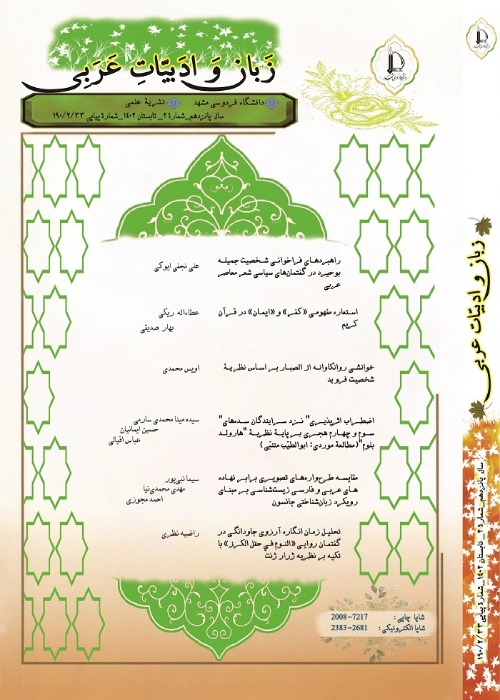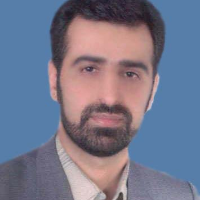Analysis of the Concept of Modernism in Ahmed Abdel Muti Hijazi's Thoughts
Author(s):
Abstract:
1.
2. Statement of the Problem: Hijazi is of the opinion that a poet is in dispute at three levels of language, thought and artistic tradition and that modernism happens in all three of these levels. In Hijazis view point, modernism in Arabic poetry is the corollary of the three Mahjar, Apollo and Diwan poetic schools which have three things in common: rebelling against language, rhythm, and the theme. From Hijazis point of view, modernism is a new necessity and reality of life which is manifest at three levels of language, structure, and theme.
From Hijazis viewpoint, what constitutes a poem is its poetic language and for him poetry means utilizing image, language, figurative expression, and music. However, he adds another element which is innovation and beauty; because, in his point of view, the end in science is the truth and the aim in poetry is beauty. Poetic modernism, in Hijazis view, is not confined to breaking down the unity of couplets, or multiplicity of rhymes or an exercise in new rhythms, but a rational expression of new logic, observed anew.
From Hijazis point of view, poem is a langue which is different from owing to its nature, before even rhythm sets it apart and thus he makes a fundamental distinction between poem and prose. But in connection with traditional language, he believes contemporary poets, without depriving the poetic language from its originality, through bestowing a new meaning to the terms of a language or changing the classic ones, should make the language more productive. From his point of view, we should divest language terms of their traditional senses, or lighten the load of their fixed and defunct connotations, spruce them up and refine them to carry unprecedented ones.
3. Research Findings: Hijazi, concerning amalgamation or separation of tradition and modernism, neither neglects the tradition, as some poets do, nor is outright loyal to it. In his view, a poet, without drowning in tradition, should utilize it. Hijazi believes in restructuring and reconstructing tradition and says that there are those among contemporaries who write the same as the past and feel like them just as back, then, there were those who wrote in a language close to our own and had the same concerns as ours.
The present study, using an analytical methodology, aims to unearth Hijazis viewpoints from his oeuvre. The findings can be summarized as follow:1. Hijazi believes in amalgamation of tradition and modernity.
2. From his point of view, modern poetry is the revival of tradition.
Hijazi, with respect to tradition and modernism, on one hand, regarding the relation between tradition and modernism, and on the other, through mentioning the precedents of poetic patterns in the history of Arabic poetry and the prevailing circumstances then, contends that modernism, from a figurative perspective, is the result of a new perception of the world by the poet. Modernism, in his view, means to answer the raised questions which are not posed only from within the poet, but are answered through the realities in the environment.
Introduction
Modernism is among the most important cultural, political, economic and social issues of our time, the most important constituent of which is change. Thus, it is quite natural that this concept confronts that of tradition, whose essence is intertwined with stagnation. Tradition has been used in three senses: 1) what is called Islamic and Shite Tradition? (Sunnah), 2) the entirety of a societys traditions and customs, and 3) an inclusive general tradition. Modernism, a derivative of modo, means of today and is used to distinguish something from previous periods. In Arabic language, terms such as Al-Asriyyah (ÇáÚÕÑیå), Al-Moasir (ÇáãÚÇÕÑ), Asraniah (ÚÕÑÇäیå), and Al-Hidasah (ÇáÍÏÇËå) are used for it. In literature, within the field of contemporary poetry, it has also been prevalent for not only is poetry a universal issue, but eschews repetition, too. Therefore, in the contemporary Arabic poetry, two movements regarding literary modernism are created. The first movement which is under the influence of the French revolution believes in The Open Door Policy and the second one is a conservative and tradition-oriented movement which aimed to elucidate and explicate heritages of the past. Thus, tradition and modernism, in contemporary Arabic poetry, confront with one another. One of the major characters who has called for modernism in poetry is the modernist poet, Ahmed Abdel MutiHijazi. ¬Hijazi can be regarded as one of the major figures of modernism in contemporary Arabic poetry. Modernism in Hijazis viewpoint means having a new projection of worlds phenomena, so, it can be said that modern poetry is the expression of life experiences, as they are felt by the poets entire being, heart, and soul.2. Statement of the Problem: Hijazi is of the opinion that a poet is in dispute at three levels of language, thought and artistic tradition and that modernism happens in all three of these levels. In Hijazis view point, modernism in Arabic poetry is the corollary of the three Mahjar, Apollo and Diwan poetic schools which have three things in common: rebelling against language, rhythm, and the theme. From Hijazis point of view, modernism is a new necessity and reality of life which is manifest at three levels of language, structure, and theme.
From Hijazis viewpoint, what constitutes a poem is its poetic language and for him poetry means utilizing image, language, figurative expression, and music. However, he adds another element which is innovation and beauty; because, in his point of view, the end in science is the truth and the aim in poetry is beauty. Poetic modernism, in Hijazis view, is not confined to breaking down the unity of couplets, or multiplicity of rhymes or an exercise in new rhythms, but a rational expression of new logic, observed anew.
From Hijazis point of view, poem is a langue which is different from owing to its nature, before even rhythm sets it apart and thus he makes a fundamental distinction between poem and prose. But in connection with traditional language, he believes contemporary poets, without depriving the poetic language from its originality, through bestowing a new meaning to the terms of a language or changing the classic ones, should make the language more productive. From his point of view, we should divest language terms of their traditional senses, or lighten the load of their fixed and defunct connotations, spruce them up and refine them to carry unprecedented ones.
3. Research Findings: Hijazi, concerning amalgamation or separation of tradition and modernism, neither neglects the tradition, as some poets do, nor is outright loyal to it. In his view, a poet, without drowning in tradition, should utilize it. Hijazi believes in restructuring and reconstructing tradition and says that there are those among contemporaries who write the same as the past and feel like them just as back, then, there were those who wrote in a language close to our own and had the same concerns as ours.
The present study, using an analytical methodology, aims to unearth Hijazis viewpoints from his oeuvre. The findings can be summarized as follow:1. Hijazi believes in amalgamation of tradition and modernity.
2. From his point of view, modern poetry is the revival of tradition.
Hijazi, with respect to tradition and modernism, on one hand, regarding the relation between tradition and modernism, and on the other, through mentioning the precedents of poetic patterns in the history of Arabic poetry and the prevailing circumstances then, contends that modernism, from a figurative perspective, is the result of a new perception of the world by the poet. Modernism, in his view, means to answer the raised questions which are not posed only from within the poet, but are answered through the realities in the environment.
Keywords:
Language:
Persian
Published:
Journal of Arabic Language & Literature, Volume:7 Issue: 2, 2016
Pages:
73 to 86
magiran.com/p1567865
دانلود و مطالعه متن این مقاله با یکی از روشهای زیر امکان پذیر است:
اشتراک شخصی
با عضویت و پرداخت آنلاین حق اشتراک یکساله به مبلغ 1,390,000ريال میتوانید 70 عنوان مطلب دانلود کنید!
اشتراک سازمانی
به کتابخانه دانشگاه یا محل کار خود پیشنهاد کنید تا اشتراک سازمانی این پایگاه را برای دسترسی نامحدود همه کاربران به متن مطالب تهیه نمایند!
توجه!
- حق عضویت دریافتی صرف حمایت از نشریات عضو و نگهداری، تکمیل و توسعه مگیران میشود.
- پرداخت حق اشتراک و دانلود مقالات اجازه بازنشر آن در سایر رسانههای چاپی و دیجیتال را به کاربر نمیدهد.
In order to view content subscription is required
Personal subscription
Subscribe magiran.com for 70 € euros via PayPal and download 70 articles during a year.
Organization subscription
Please contact us to subscribe your university or library for unlimited access!



